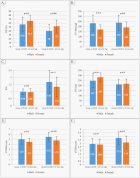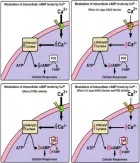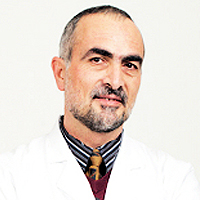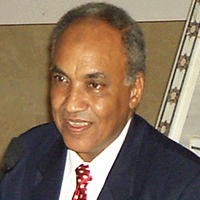Abstract
Research Article
Institutional capacity of health care institutes for diagnosis and management of common genetic diseases - A study from a north coastal district of Andhra Pradesh
Koteswara Rao Pagolu* and T Raghava Rao
Published: 28 June, 2021 | Volume 2 - Issue 1 | Pages: 007-013
Background: In India, the genetic disease is a disregarded service element in the community health- protection system. This study aims to gauge the accessibility of services for treating genetic disorders and also to evaluate the practices on deterrence and management services in the district health system.
Methods: A cross-sectional survey of selected health amenities from 454 medical officers (MO’s), 94 accredited social health activist (ASHAs) workers, 86 multipurpose health assistant-female (MPHA-F), 34 multipurpose health assistant-male (MPHA-M), 14 multipurpose health supervisors-female (MPHS-F), 10 multipurpose health supervisors-male (MPHS-M), 6 multipurpose health extension officer/ community health officer (MPHEO/CHO), 10 public health nurse (PHN), 45 lab technicians (LT’s) working in the government health sector and 254 in the private health sector, 409 nursing staff working in the government health sector and 995 in the private health sector, 15 primary health centers (PHC’s), 4 community health centers (CHC’s), 1 district government hospital (DGH), 3 referral hospitals (RH’s). From the side of private health institutions 25 corporate hospitals (CH’s), 3 medical colleges (MC’s), and 25 diagnostic laboratories (DL’s) were conducted.
Results: The findings show that adequate staff was in place at more than 70% of health centers, but none of the staff have obtained any operative training on genetic disease management. The largest part of the DH’s had rudimentary infrastructural and diagnostic facilities. However, the greater part of the CHC’s and PHC’s had inadequate diagnostic facilities related to genetic disease management. Biochemical, molecular, and cytogenetic services were not available at PHC’s and CHC’s. DH’s, RH’s, and all selected medical colleges were found to have offered the basic Biochemical genetics units during the survey. In 24% of CH’s, the basic biochemical units are available and 32% (8 out of 25) of DL’s have the advanced biochemical genetics units by study. Molecular genetics units were found to be available in 28% (7 out of 25) of DL’s during the study. About 6 (24%) diagnostic centers of cytogenetic laboratories were located in the Visakhapatnam district under the private sector.
Conclusion: The district health care infrastructure in India has a shortage of basic services to be provided for the genetic disorder. With some policy resolutions and facility strengthening, it is possible to provide advanced services for a genetic disorder in the district health system.
Read Full Article HTML DOI: 10.29328/journal.jcmhs.1001008 Cite this Article Read Full Article PDF
Keywords:
District health system; Genetic disorder; Management practices; Deterrence; Infrastructural amenities
References
- Chokshi M, Patil BKR, Neogi SB, Sharma J, Paul VK, et al. Health systems in India. J Perinatol. 2016; 36: 9-12. PubMed: https://pubmed.ncbi.nlm.nih.gov/27924110/
- Jindal AK. Universal health coverage: the way forward. Indian J Public Health. 2014; 58: 161-167. PubMed: https://pubmed.ncbi.nlm.nih.gov/25116821/
- Jaysawal N. Rural Health System in India: A Review. Int J Social Work Human Ser Practice. 2015; 3: 29-37.
- Ravi S, Gupta D, Williams J. Restructuring the Medical council of India. Brookings India. Impact Series. 2017.
- Shubha RP, Ratna DP, Prajnya R. Prenatal screening for genetic disorders: suggested guidelines for the Indian scenario. Indian J Med Res. 2017; 146: 689-699. PubMed: https://pubmed.ncbi.nlm.nih.gov/29664026/
- Bell SG. Ethical implications of rapid whole-genome sequencing in neonates. Neonatal Netw. 2018; 37: 42-44. PubMed: https://pubmed.ncbi.nlm.nih.gov/29436358/
- Clark MM, Hildreth A, Batalov S, Ding Y, Chowdhury S, et al. Diagnosis of genetic diseases in seriously ill children by rapid whole-genome sequencing and automated phenotyping and interpretation. Sci Transl Med. 2019; 11: eaat6177. PubMed: https://pubmed.ncbi.nlm.nih.gov/31019026/
- GUaRDIAN Consortium, Sridhar S, Vinod S. Genomics of rare genetic diseases-experiences from India. Hum Genomics. 2019; 13: 14: 52. PubMed: https://pubmed.ncbi.nlm.nih.gov/31554517/
- ICMR’s ethics guidelines. National ethical guidelines for biomedical and health research involving human participants. Indian Council Med Res. 2017.
- Venugopal A, Chandran M, Eruppakotte N, Kizhakkillach S, Breezevilla SC, et al. Monogenic diseases in India. Mutation Res. 2018; 776: 23-31. PubMed: https://pubmed.ncbi.nlm.nih.gov/29807575/
- Verma IC, Bijarnia S. The burden of genetic disorders in India and a framework for community control. Community Genet. 2002; 5: 192-196. PubMed: https://pubmed.ncbi.nlm.nih.gov/14960891/
- Jain R, Rao B. Role of laboratory services in primary health center (PHC) outpatient department performance: an Indian case study. Prim Health Care Res Dev. 2019; 20: e112.
- Recommended Universal Screening Panel. https://www.hrsa.gov/advisory-committees/heritable-disorders/rusp/index.html.2020
- Graf von der Schulenburg JM, Frank M. Rare is frequent and frequent is costly: rare diseases as a challenge for health care systems. Eur J Health Econom. 2015; 16: 113-118. PubMed: https://pubmed.ncbi.nlm.nih.gov/25355295/
- Mookken T. Universal Implementation of Newborn Screening in India. Int J Neonatal Screen. 2020; 24: 6: 24. PubMed: https://pubmed.ncbi.nlm.nih.gov/33073021/
- Mookken T, Cariappa R. (NeoGen Labs, Bangalore, Karnataka, India). Personal communication. 2019.
- Aggarwal S, Phadke SR. Medical genetics and genomic medicine in India: current status and opportunities ahead. Molecular Gene Genom Med. 2015: 160-171. PubMed: https://pubmed.ncbi.nlm.nih.gov/26029702/
- National Policy for Treatment of Rare Diseases. 2021. https://mohfw.gov.in/sites/default/files/RareDiseasesPolicyFINAL.pdf
- Indian Rare Disease Registry. 2019. http://bmi.icmr.org.in/irdr/index.php
Figures:
Similar Articles
-
Institutional capacity of health care institutes for diagnosis and management of common genetic diseases - A study from a north coastal district of Andhra PradeshKoteswara Rao Pagolu*,T Raghava Rao. Institutional capacity of health care institutes for diagnosis and management of common genetic diseases - A study from a north coastal district of Andhra Pradesh. . 2021 doi: 10.29328/journal.jcmhs.1001008; 2: 007-013
Recently Viewed
-
Agriculture High-Quality Development and NutritionZhongsheng Guo*. Agriculture High-Quality Development and Nutrition. Arch Food Nutr Sci. 2024: doi: 10.29328/journal.afns.1001060; 8: 038-040
-
A Low-cost High-throughput Targeted Sequencing for the Accurate Detection of Respiratory Tract PathogenChangyan Ju, Chengbosen Zhou, Zhezhi Deng, Jingwei Gao, Weizhao Jiang, Hanbing Zeng, Haiwei Huang, Yongxiang Duan, David X Deng*. A Low-cost High-throughput Targeted Sequencing for the Accurate Detection of Respiratory Tract Pathogen. Int J Clin Virol. 2024: doi: 10.29328/journal.ijcv.1001056; 8: 001-007
-
A Comparative Study of Metoprolol and Amlodipine on Mortality, Disability and Complication in Acute StrokeJayantee Kalita*,Dhiraj Kumar,Nagendra B Gutti,Sandeep K Gupta,Anadi Mishra,Vivek Singh. A Comparative Study of Metoprolol and Amlodipine on Mortality, Disability and Complication in Acute Stroke. J Neurosci Neurol Disord. 2025: doi: 10.29328/journal.jnnd.1001108; 9: 039-045
-
Development of qualitative GC MS method for simultaneous identification of PM-CCM a modified illicit drugs preparation and its modern-day application in drug-facilitated crimesBhagat Singh*,Satish R Nailkar,Chetansen A Bhadkambekar,Suneel Prajapati,Sukhminder Kaur. Development of qualitative GC MS method for simultaneous identification of PM-CCM a modified illicit drugs preparation and its modern-day application in drug-facilitated crimes. J Forensic Sci Res. 2023: doi: 10.29328/journal.jfsr.1001043; 7: 004-010
-
A Gateway to Metal Resistance: Bacterial Response to Heavy Metal Toxicity in the Biological EnvironmentLoai Aljerf*,Nuha AlMasri. A Gateway to Metal Resistance: Bacterial Response to Heavy Metal Toxicity in the Biological Environment. Ann Adv Chem. 2018: doi: 10.29328/journal.aac.1001012; 2: 032-044
Most Viewed
-
Evaluation of Biostimulants Based on Recovered Protein Hydrolysates from Animal By-products as Plant Growth EnhancersH Pérez-Aguilar*, M Lacruz-Asaro, F Arán-Ais. Evaluation of Biostimulants Based on Recovered Protein Hydrolysates from Animal By-products as Plant Growth Enhancers. J Plant Sci Phytopathol. 2023 doi: 10.29328/journal.jpsp.1001104; 7: 042-047
-
Sinonasal Myxoma Extending into the Orbit in a 4-Year Old: A Case PresentationJulian A Purrinos*, Ramzi Younis. Sinonasal Myxoma Extending into the Orbit in a 4-Year Old: A Case Presentation. Arch Case Rep. 2024 doi: 10.29328/journal.acr.1001099; 8: 075-077
-
Feasibility study of magnetic sensing for detecting single-neuron action potentialsDenis Tonini,Kai Wu,Renata Saha,Jian-Ping Wang*. Feasibility study of magnetic sensing for detecting single-neuron action potentials. Ann Biomed Sci Eng. 2022 doi: 10.29328/journal.abse.1001018; 6: 019-029
-
Pediatric Dysgerminoma: Unveiling a Rare Ovarian TumorFaten Limaiem*, Khalil Saffar, Ahmed Halouani. Pediatric Dysgerminoma: Unveiling a Rare Ovarian Tumor. Arch Case Rep. 2024 doi: 10.29328/journal.acr.1001087; 8: 010-013
-
Physical activity can change the physiological and psychological circumstances during COVID-19 pandemic: A narrative reviewKhashayar Maroufi*. Physical activity can change the physiological and psychological circumstances during COVID-19 pandemic: A narrative review. J Sports Med Ther. 2021 doi: 10.29328/journal.jsmt.1001051; 6: 001-007

HSPI: We're glad you're here. Please click "create a new Query" if you are a new visitor to our website and need further information from us.
If you are already a member of our network and need to keep track of any developments regarding a question you have already submitted, click "take me to my Query."

















































































































































